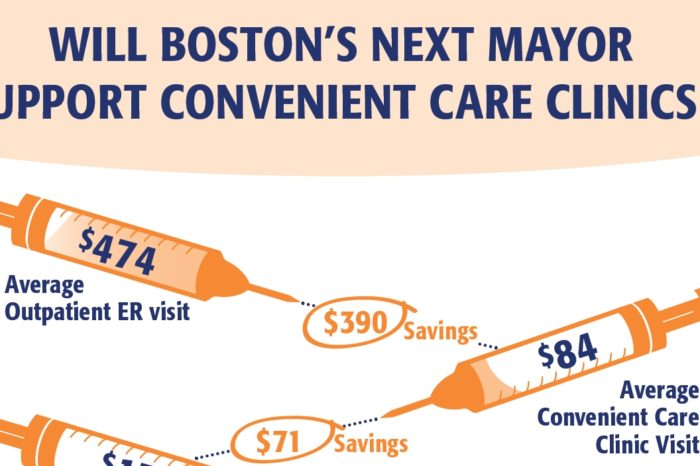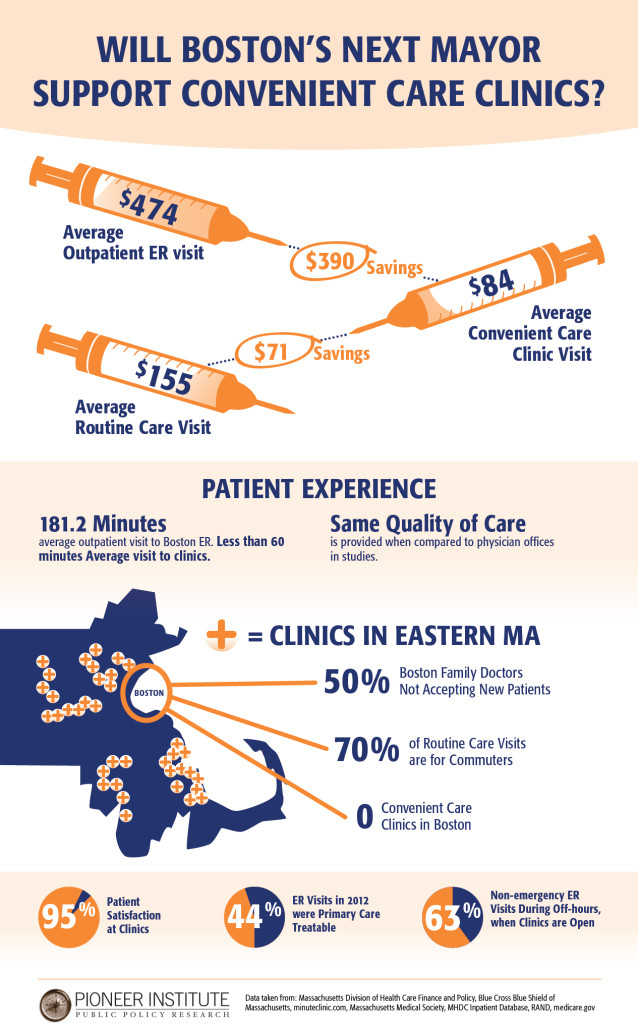Why Boston’s Ban on Convenient Care Clinics Is Costing Taxpayers Millions
Study Urges Boston Mayoral Candidates to Reverse City Policy, Open Doors for Convenient Care Clinics
Clinics provide convenient, cost-effective care for minor illnesses and conditions
BOSTON – Making it possible for convenient care clinics to open in Boston would help meet the statewide potential to save $6 billion over 10 years, steer patients away from costly emergency room visits and offer a cost-effective way to provide more families with better access to care for minor illnesses and conditions, according to a new Policy Brief published by Pioneer Institute.
“As the Boston mayor’s race heads in to the home stretch, I hope the two finalists will consider reversing current policy and welcome convenient care clinics to Boston,” said Josh Archambault, a Pioneer Institute senior health care fellow and co-author of “Mayor, Tear Down this Wall: Why Boston’s Ban on Convenient Care Clinics is Costing Taxpayers Millions.”
Convenient care clinics are small health care clinics in retail environments that provide more convenient, lower-cost care. They are staffed by nurse practitioners and overseen by physicians.
Boston currently has no convenient care clinics due to opposition from outgoing Mayor Thomas Menino. There are a number of clinics in other parts of eastern Massachusetts. Nationally, the number of convenient care clinics increased by more than 600 percent from 2006 to 2012 and continued rapid growth is forecast.
A 2009 RAND Corporation study found the quality of care in convenient care clinics was the same as for physicians’ office visits and better than emergency room care. The clinics also offer more convenience than emergency rooms. The average convenient care clinic wait time for a patient without an appointment is 15-to-20 minutes.
Clinics are also more cost effective. The average cost of an outpatient emergency room visit in Massachusetts is $474 and an illness visit to a primary care physician averages $150, but the cost per visit for one chain of the commonwealth’s convenient care clinics is $84.
Convenient care clinics can also save money by reducing the number of emergency room visits. While the number of ER visits in Massachusetts rose by 6 percent from 2006 to 2010, the cost of those visits jumped by more than 36 percent.
Clinics would better serve the 30 percent of Boston residents who are on Medicaid by providing lower-cost, more convenient care. State taxpayers would also benefit. Boston residents on Medicaid represent 14 percent of the statewide Medicaid population and the current absence of convenient care clinics in the city means taxpayers are subsidizing higher-cost care.
Finally, clinics would help address the shortage of primary care physicians. Only about half the family practices in Suffolk County currently accept new patients and there are long wait times for appointments. The situation is unlikely to improve any time soon, since less than one-quarter of new physicians are currently going into primary care.
“Mayor, Tear Down this Wall: Why Boston’s Ban on Convenient Care Clinics is Costing Taxpayers Millions” was co-authored by Lucy Hicks, a senior at Duke University and 2013 Pioneer Institute intern.
###
Pioneer Institute is an independent, non-partisan, privately funded research organization that seeks to improve the quality of life in Massachusetts through civic discourse and intellectually rigorous, data-driven public policy solutions based on free market principles, individual liberty and responsibility, and the ideal of effective, limited and accountable government.




